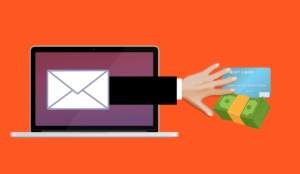In any industry where money is transferred or large bills are paid,the door is open for hacks. In manufacturing they pay large vendors for all materials and sometimes overseas. In construction developers pay contractors huge sums of money for labor and materials. You might be buying a home or an expensive piece of art, and either way, these transactions are typically not done in cash. You might think that in well-established industries such as the real estate industry, construction and manufacturing, there are checks and balances, but this isn’t totally the case. The same goes for the art industry.
 Most of us won’t be buying multi-million-dollar pieces of art imported from Italy, but many people reading this will buy a home.
Most of us won’t be buying multi-million-dollar pieces of art imported from Italy, but many people reading this will buy a home.
As we look at the home buying process and scams, the information is pretty frightening. The Internet Crime Complaint Center, which is part of the FBI, released a report that showed email fraud in the real estate industry rose more than 1,110% from 2015 to 2017. The amount of money lost in real estate fraud rose approximately 2,200%. What does this mean? It means scammers are more efficient than ever before. In 2020 that number jumped another 13%. Recently in a real estate transaction a psychology professor at UC Berkeley, wired $921,235.10 to scammers.
In 2017, almost 10,000 people reported that they were a victim of fraud and identity theft during real estate transactions, and in total, the money lost topped $56 million. Only recently has the real estate community been paying attention to this, but it’s just not enough. Again, the same thing can be said about the art world. Both of these industries are having big issues with fraud.
The Story You Have to Hear
Every once in a while, I meet someone in my travels who seem to have the perfect life…or at least I would consider it to be pretty great. These people are smart, they have made the right choices, they have worked hard, and they have reaped some amazing awards. A couple of years ago I met a married couple who had this perfect life. The guy was literally into money. His job was to not just handle investments for companies, but for actual countries. He brought in huge commissions for this work, and the pair could literally buy anything that they wanted. However, this also made them a target for scammer.
With all of the money they had, the couple soon got into a new hobby: collecting fine art. Though I don’t know a ton about art, I can tell you that their collection was pretty amazing. They primarily collected at type of art called hyperrealism. Essentially, artists who work in hyperrealism create paintings that look like photographs. Look it up…it’s very cool.
Long story short, the guy decided that he wanted to buy a new painting. It had a price tag of $200,000, and he did this via email. Now typically, this is where alarm bells might go off, but the guy didn’t think this was weird, as he had done it like this several times before. This time, though, things were different.
You see, as he was emailing with the gallery he purchased the paintings from, a hacker was able to intercept the emails because the gallery got hacked. Instead of wiring the $200,000 to the gallery, he wired it directly to the hacker.
Keep in mind, this guy was in finance, and people in this industry are specifically conditioned to know about risk. After talking about it later, he said that there were a couple of things in the emails that could be a sign that something was wrong, but again, doing transactions via email is pretty standard in the art industry as it is in real estate.
Thankfully, his bank noticed the transaction because the account that he wired to was brand new, and the system his bank used was set up to flag any transactions that go to a new account, especially with that amount of money.
Once his bank got in contact with him, he immediately contacted the gallery and they confirmed that they had not gotten the money, and instead, it was probably a fraud. Of course he panicked, and thought his $200,000 was about to vanish. He called anyone and everyone he could think of to stop the transaction.
Finally, he realized that his company had a connection to someone higher up at the bank. He was able to get a personal call in, and they were able to stop the wire from completing. He was very lucky, but not everyone is.
Understanding How the Hack Works
Though scammers have options at their fingertips, they do tend to like this hack, and they use it to target collectors, art galleries, manufacturers, construction companies, developers, and of course real estate companies, and more. So, if you work in these industries, or you interact with people in these industries, make sure you keep your eyes open.
Essentially, these hackers get information from data breaches, which give them email addresses and passwords from millions of people. So, when the art gallery sends an invoice to the art collector via email, the hacker realizes it, and they will step in.
The hacker takes on the persona of the dealer, the real estate agent, the developers bookkeeper, or the construction companies accountant, and comes up with a story that the client might believe, such as they need to issue a new invoice because there was a typo on it, or they need to change the instructions that the client must follow. They do this so that they can justify a change in the wiring and might even say that they can offer a small discount for the inconvenience. Usually, the buyer or the admin is happy to do this, and once the money is sent, the hacker collects it and disappears.
Victims of These Scams
When we look at these scams, both the buyer and the seller, and all the companies involved are victims here. They are all left in the dark, and the hacker hijacks the communication. In other words, they control the emails, and they play both of the parts. In the art industry, for instance, when the gallery sends an email to its customer, the hacker intercepts the email and pretends to be the customer. The same thing happens when the customer sends an email to the gallery.
Since the hacker does this, there is plenty of time to cover their tracks and disappear. In the meantime, time and money is lost, and in some cases, the art gallery has even had to shut down for good.
Tips to Keep You Safe
If you work in any of these industries, keep these tips in mind:
- Email account passwords should be very strong and unique. Don’t ever use the same password for more than one account. When creating a password, use uppercase and lowercase letters, and mix them with characters and numbers…and change them frequently.
- Use password manager software and have a different password for every account.
- Set up two-step authentication for your email account. When you log in, you will get a one-time password to your mobile phone, which means someone would need your password and your phone to get into your account.
- Use an escrow service if you are sending large sums of cash.
- Pick up the phone and call to confirm every step of the transaction.
- Keep your anti-virus software updated.
- When you send an invoice through email, text or call the recipient to check that they got it and that the account number is correct.
- Talk to your staff about the importance of security, and make sure they understand what phishing scams are. Also, teach them not to click on any attachments or links in an email unless they have confirmed and verified the link or attachment by phone.
ROBERT SICILIANO CSP, is a #1 Best Selling Amazon author, CEO of CreditParent.com, the architect of the CSI Protection certification; a Cyber Social and Identity and Personal Protection security awareness training program.




 You might be wondering how you can become a victim of an identity thief just by filing your taxes. There are a couple of ways scammers do this. First, the thief will use your Social Security number to file taxes, but plug in their mailing address and then when your refund comes around, they take your refund.
You might be wondering how you can become a victim of an identity thief just by filing your taxes. There are a couple of ways scammers do this. First, the thief will use your Social Security number to file taxes, but plug in their mailing address and then when your refund comes around, they take your refund.


 Most of us won’t be buying multi-million-dollar pieces of art imported from Italy, but many people reading this will buy a home.
Most of us won’t be buying multi-million-dollar pieces of art imported from Italy, but many people reading this will buy a home. None of us believe that we will be hacked, but we have seen over and over again that it is possible. Even the biggest companies out there have been hacked, and a small company is even more at risk of this. Add the use of a program called Remote Desktop offered by Microsoft or Google Chrome or many other third-party remote access programs, and you need to be aware of some things.
None of us believe that we will be hacked, but we have seen over and over again that it is possible. Even the biggest companies out there have been hacked, and a small company is even more at risk of this. Add the use of a program called Remote Desktop offered by Microsoft or Google Chrome or many other third-party remote access programs, and you need to be aware of some things.























